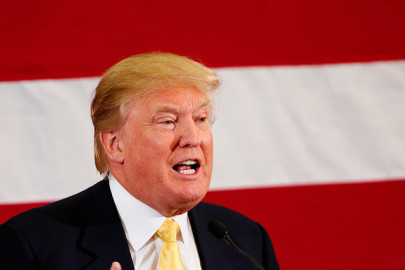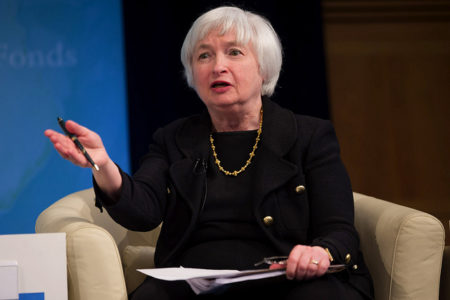By Peter Ward September 23, 2016
Trump’s Trade Plan Cost Calculated

Donald Trump ©Michael Vadon
How much would Donald Trump’s proposed trade plan cost the U.S? An article published in the Wall Street Journal this week crunches data compiled by the Peterson Institute for International Economics.
Republican nominee Trump has proposed imposing harsh tariffs on China and Mexico, and, according to the study, this could push the U.S. into a recession and cost 5 million American jobs.
The Peterson Institute argues that in the worst case scenario, the tariffs on China and Mexico would spark a trade war with the two countries, in which they would retaliate by putting tariffs on U.S. goods and services. This would cause U.S. exports and imports to shrink, import prices to rise and stock prices to tumble, the study finds.
A map visualizing the data shows the likely outcome in each state of the U.S. According to the research Washington state would lose 5% of private sector jobs as a result of Trump’s proposal, and California would lose 4.8%.
On a county level, the study found that Los Angeles County and Chicago’s Cook County would lose the most jobs under Trump’s trade proposal.
The Peterson Institute is a Washington, D.C.-based think tank that favors free trade. The study claimed that Democratic nominee Hillary Clinton’s trade plan would also be harmful, but not as destructive as Trump’s. The Trump campaign labeled the report as “propaganda.”
Racial Wage Gap Grows

Office colleagues. ©Pixabay
The racial wage gap is getting worse. Black men and women in the U.S. earn significantly less than their white counterparts and the difference has widened over the past 36 years, an article published by the Huffington Post this week explains.
Research by the Economic Policy Institute found that in 2015, black men earned 22% less than white men living in the same regions and with comparable education and experience. In 1979, black men earned 16.9% less. Black women in 2015 earned 11.7% than their white peers, an increase from 4.5% less in 1979, according to the data.
The Economic Policy Institute chose 1979 as a starting point because that year wages across the country stopped growing in tandem with productivity. The researchers wanted to see how the deterioration of workers’ share of economic growth affected African-Americans in particular.
“People should be troubled and really question why we would observe this pattern through 2015,” said Valerie Wilson, director of the liberal think tank’s Program on Race, Ethnicity and the Economy. “Is the American dream really obtainable ― equally obtainable for all people?”
For black women, the racial pay gap only added to the larger gender pay gap. Black women earned 34.2% less than white men with comparable education, experience and living the same regions.
Baseball’s Low Wages

Montgomery Biscuits minor league baseball (affiliate of Tampa Bay Rays) pitcher #34 Jacob Thompson ©ErinNik, Wikimedia Commons, CC BY-SA 3.0
It’s easy to assume that all professional sportspeople earn huge wages, but a feature published in The Atlantic this week finds that is not the case. The article examines the earnings of professional baseball players, and the lawsuits which have been filed over low pay in recent years.
The less talented players in Major League Baseball can play in relative obscurity on minor-league teams, which funnel talent to the larger teams. Many of these minor league players make as little as $3,000 to $7,500 for a five-month season.
Dirk Hayhurst, who wrote the memoir The Bullpen Gospels, which documents his time as a minor-league pitcher, says that due to mandatory team fees that the players have to pay, their salaries can be reduced to less than $300 per month.
The low pay has prompted dozens of former players to file suits against the MLB. The first, Senne v MLB, alleges that the organization violates federal minimum wage statutes, and claims that it’s not fair that the season includes stretches of unpaid labor, as the league doesn’t pay players during pre-season spring training.
According to the article, the MLB is able to maintain such low wages due to a clause in the 1938 Fair Labor Standards Act that says that minimum-wage and overtime requirements do not apply to “any employee employed by an establishment which is an amusement or recreational establishment” that “does not operate for more than seven months in any calendar year.”
Fed Hints at Rate Hike This Year

Federal Reserve Chairman Janet Yellen ©International Monetary Fund
The Federal Reserve announced this week that it will be holding off on raising interest rates, but says that a rate hike is still likely this year.
“Near-term risks to the economic outlook appear roughly balanced,” the Federal Open Market Committee said in its statement Wednesday after a two-day meeting in Washington. “The Committee judges that the case for an increase in the federal funds rate has strengthened but decided, for the time being, to wait for further evidence of continued progress toward its objectives.”
In short, the Fed believes the U.S. economy is performing well, but not well enough to justify raising interest rates just yet. Interest rates were lowered to historically low levels in response to the Great Recession. The Fed’s interest rate range is currently at 0.25%-0.50%, where it has been since the Fed raised rates last December, the first increase in almost a decade.
“The economy has a bit more running room than might have been previously thought,” Yellen said. At the same time, she added she did not “want the economy to overheat” and the case for a rate increase “has strengthened.”
The Fed will meet to discuss interest rates twice more this year, once in November two days before the Presidential election, and again in December.
This Week’s Top Headlines
Hanjin Shipping shares rally 28 percent after Korean Air approves lending Hyunjoo Jin, Reuters
Shipping giant Maersk to split up and focus on North Sea – BBC
EU Gave Billions in Illegal Subsidies to Airbus, WTO Rules – Robert Wall and Doug Cameron, The Wall Street Journal
Instead of Great Divergence, Central Banks Are Converging Again – Enda Curran, Bloomberg
U.S. Allows Boeing and Airbus to Sell Planes to Iran – Thomas Erdbrink, Nicola Clark, The New York Times
Yahoo is expected to confirm a massive data breach, impacting hundreds of millions of users – Kara Swisher, Recode
U.S. existing home sales unexpectedly fall in August – Lindsay Dunsmuir, Reuters
Lawmakers slam EpiPen maker for rising prices, as CEO downplays profits – Fox News
In Wells Fargo’s Bogus Accounts, Echoes of Foreclosure Abuses – Gretchen Morgenson, The New York Times
VW hit by flood of new lawsuits in emissions scandal – BBC
This entry was posted on Friday, September 23rd, 2016 at 5:54 pm. It is filed under Week in Review. You can follow any responses to this entry through the RSS 2.0 feed.
Comments are closed.
